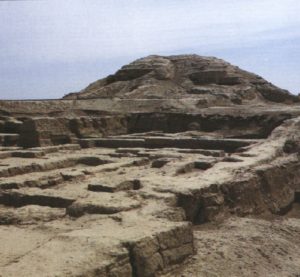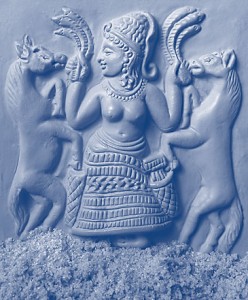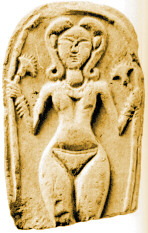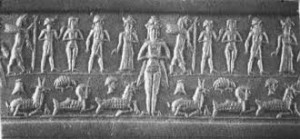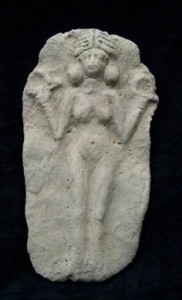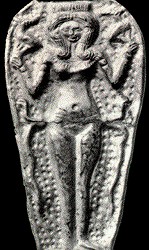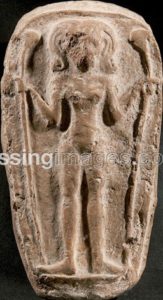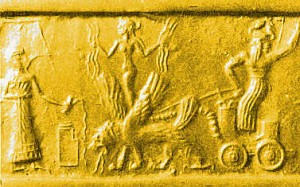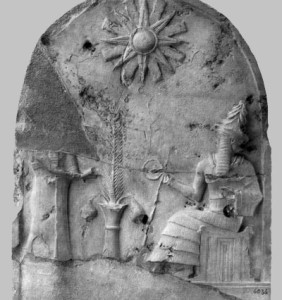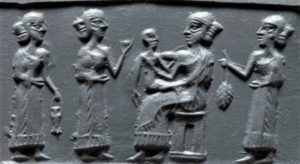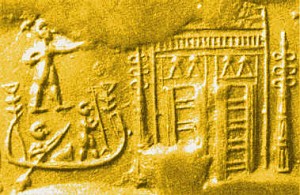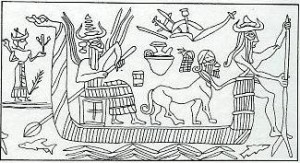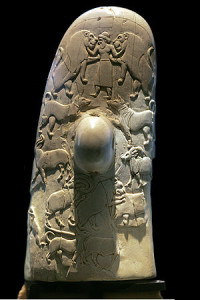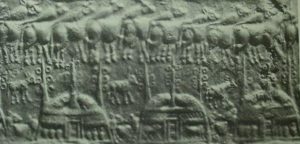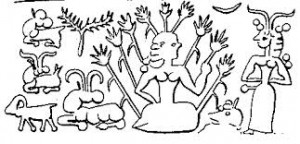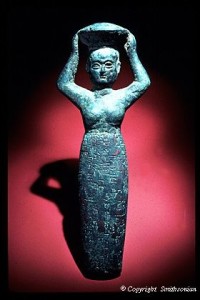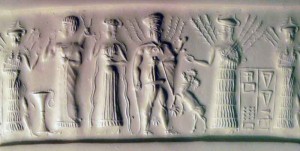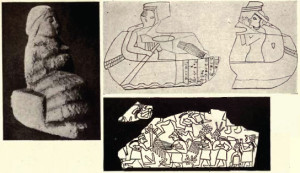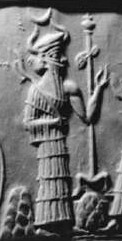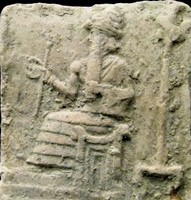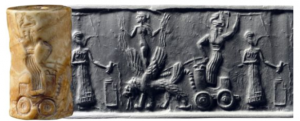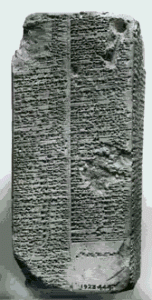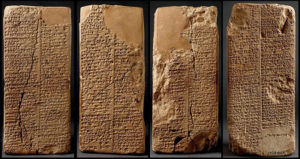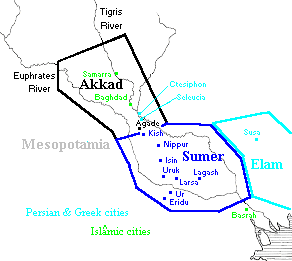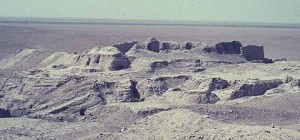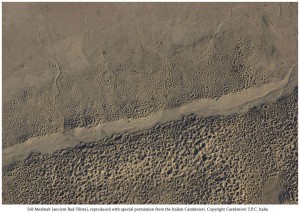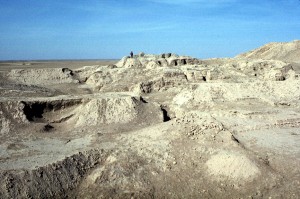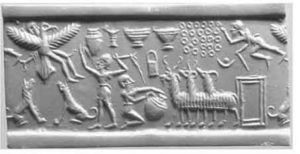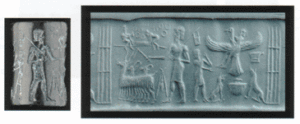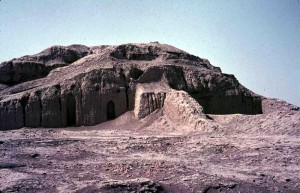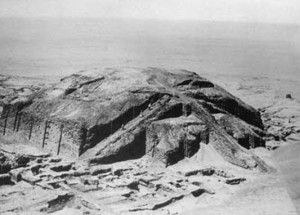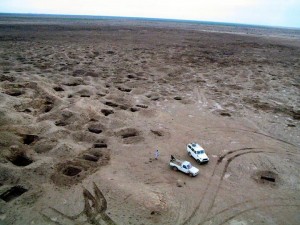Source (for translation): Black, J.A., Cunningham, G., Robson, E., and Zólyomi, G., The Electronic Text Corpus of Sumerian Literature,
Oxford 1998-.
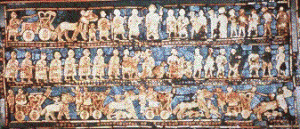
(Enmerkar & the Lord of Aratta – artifact)
(Texts: All Artifacts, Color Coding, & Writings in Bold Type With Italics Inside Parenthesis, are Added by Editor R. Brown, not the Authors, Translators, or Publishers!)
(gods in blue …mixed-breed demigods in teal…)
Enmerkar is the priest-king (en) of Uruk, and as such, the ritual husband of the Great Goddess Inanna, upon whose favor the city´s prosperity depends. But the city of Aratta, in the snow-capped mountains that border Mesopotamia is also under the protection of the Goddess, and ruled by an en devoted to Her as well.
In order to please the gods, Enmerkar plans to build a lavish temple in Uruk which would be the first among its kind.
1-24 City majestic bull bearing vigor and great awesome splendor,
Kulaba, ……, breast of the storm, where destiny is determined;
Unug (Uruk), great mountain, in the midst of …….
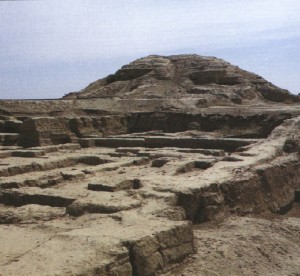 (Anu‘s ziggurat temple residence in Uruk, mountain mud brick-built by the Anunnaki)
(Anu‘s ziggurat temple residence in Uruk, mountain mud brick-built by the Anunnaki)
There the evening meal of the great abode of An (Anu) was set.
In those days of yore, when the destinies were determined,
the great princes allowed Unug Kulaba’s E-ana to lift its head high.
Plenty, and carp floods, and the rain which brings forth dappled barley were then increased in Unug Kulaba.
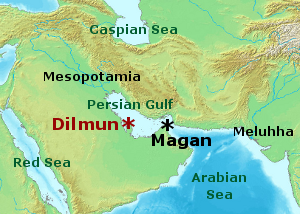 (Dilmun, pristine lands given Ninsikila by her father Enki)
(Dilmun, pristine lands given Ninsikila by her father Enki)
Before the land of Dilmun yet existed, the E-ana of Unug Kulaba was well founded,
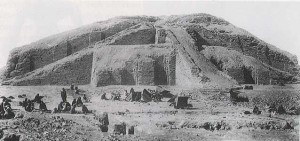 (Anu‘s residence in Uruk when on Earth)
(Anu‘s residence in Uruk when on Earth)
and the holy jipar of Inanna in brick-built Kulaba shone forth like the silver in the lode.
Before …… carried ……, before ……, before …… carried ……, before the commerce was practiced;
before gold, silver, copper, tin, blocks of lapis lazuli,
and mountain stones were brought down together from their mountains,
before …… bathed for the festival, ……, …… time passed.
2 lines missing
25-32 …… was colorfully adorned, and ……,
the holy place, was …… with flawless lapis lazuli (blue-hued gemstone),
its interior beautifully formed like a white mes tree bearing fruit.
(flying sky-disc of the gods, the symbol of their home, planet Nibiru)
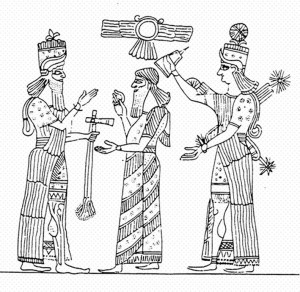 (Ashur & a giant mixed-breed descendant-king crowned by goddess Inanna)
(Ashur & a giant mixed-breed descendant-king crowned by goddess Inanna)
The lord of Aratta placed on his head the golden crown for Inanna.
But he did not please her like the lord of Kulaba.
Aratta did not build for holy Inanna — unlike the Shrine E-ana,
the jipar, the holy place, unlike brick-built Kulaba (Uruk ziggurat).
33-37 At that time, the lord chosen by Inanna in her heart,
chosen by Inanna in her holy heart from the bright mountain,
Enmerkar, the (giant grandson) son of Utu, made a plea to his sister (grandaunt to Enmerkar),
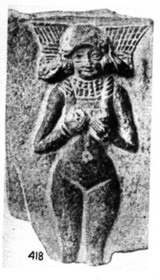
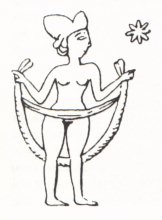 (Inanna, Goddess of Love, spouse to scores of demigod mixed-breed kings)
(Inanna, Goddess of Love, spouse to scores of demigod mixed-breed kings)
the lady who grants desires, holy Inanna (Uruk King Enmerkar‘s spouse):
38-64 “My sister, let Aratta fashion gold and silver skillfully on my behalf for Unug (Uruk).
Let them cut the flawless lapis lazuli (favorite gemstone of goddesses) from the blocks, let them ……
the translucence of the flawless lapis lazuli ……. ……build a holy mountain (ziggurat) in Unug.
Let Aratta build a temple brought down from heaven — your place of worship, the Shrine E-ana;
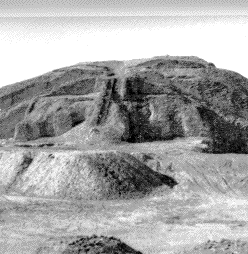 (E-ana, Anu‘s mud brick-built ziggurat temple residence in Uruk)
(E-ana, Anu‘s mud brick-built ziggurat temple residence in Uruk)
let Aratta skillfully fashion the interior of the holy jipar, your abode;
may I, the radiant youth, may I be embraced there by you.
Let Aratta submit beneath the yoke for Unug on my behalf.
Let the people of Aratta bring down for me the mountain stones from their mountain,
build the great shrine for me, erect the great abode for me, make the great abode,
the abode of the gods, famous for me, make my me prosper in Kulaba,
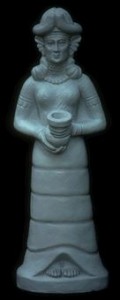
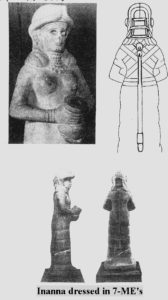 (Inanna wearing the 7 MEs, advanced alien technologies for flight)
(Inanna wearing the 7 MEs, advanced alien technologies for flight)
make the Abzu (Eridu, in the marshlands) grow for me like a holy mountain,
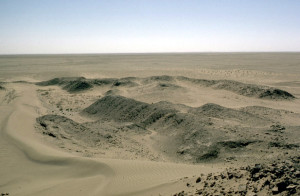 (Eridu ruins, decimated & desolate for thousands of years)
(Eridu ruins, decimated & desolate for thousands of years)
make Eridug (Eridu, Enki‘s patron city) gleam for me like the mountain range,
cause the Abzu shrine to shine forth for me like the silver in the lode.
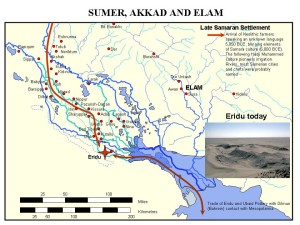 (1st cities established by alien gods)
(1st cities established by alien gods)
When in the Abzu (marshlands of the Persian Gulf) I utter praise,
when I bring the me (alien technologies) from Eridug (Eridu, Enki‘s patron city),
when, in lordship, I am adorned with the crown like a purified shrine,
when I place on my head the holy crown in Unug Kulaba,
then may the …… of the great shrine bring me into the jipar,
and may the …… of the jipar bring me into the great shrine.
May the people marvel admiringly, and may Utu witness it in joy.”
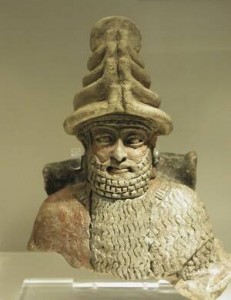 (Utu, son to Nannar, grandson to Earth Colony Commander Enlil)
(Utu, son to Nannar, grandson to Earth Colony Commander Enlil)
65-68 Thereupon the splendor of holy (alien King) An, the lady of the mountains, the wise,
the goddess whose kohl is for Ama-ucumgal-ana (Dumuzi), Inanna, the lady of all the lands,
called to Enmerkar the (giant mixed-breed grandson) son of Utu:
69-104 “Come, (King) Enmerkar! I shall offer you advice:
let my counsel be heeded. I shall speak words to you; let them be heard.
Choose from the troops as a messenger one who is eloquent of speech and endowed with endurance.
Where and to whom shall he carry the important message of wise Inanna?
Let him bring it up into the Zubi Mountains, let him descend with it from the Zubi Mountains.
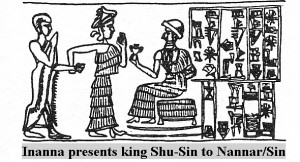 (Ninsun‘s son Shu-Sin, Inanna, & Nannar, patron god of Ur)
(Ninsun‘s son Shu-Sin, Inanna, & Nannar, patron god of Ur)
Let (King) Su-sin and the land of Ancan humbly salute Inanna like tiny mice.
In the great mountain ranges, let the teeming multitudes grovel in the dust for her.
Aratta shall submit beneath the yoke to Unug (Uruk).
The people of Aratta shall bring down the mountain stones from their mountains,
and shall build the great shrine for you, and erect the great abode for you,
will cause the great abode, the abode of the gods, to shine forth for you;
will make your me flourish in Kulaba, will make the Abzu grow for you like a holy mountain,
will make Eridug (Eridu) shining for you like the mountain range,
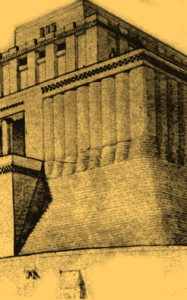 (re-creation of Enki‘s house in Eridu, built on the river bank, in the marshes of Persian Gulf)
(re-creation of Enki‘s house in Eridu, built on the river bank, in the marshes of Persian Gulf)
will cause the Abzu shrine (Enki‘s ziggurat temple residence in Eridu)
to shine forth for you like the glitter in the lode.
When in the Abzu you utter praise, when you bring the me (alien technologies) from Eridug (Eridu),
when, in lordship, you are adorned with the crown like a purified shrine,
when you place on your head the holy crown in Unug Kulaba,
then may the …… of the great shrine bring you into the jipar,
and may the …… of the jipar bring you into the great shrine.
May the people marvel admiringly, and may Utu witness it in joy.
Because …… shall carry daily, when …… in the evening cool ……,
— in the place of Dumuzid (Dumuzi the Shepherd) where the ewes,
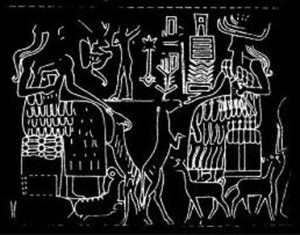
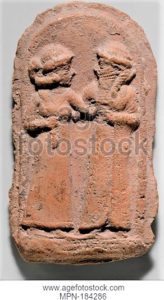 (Inanna & spouse Dumuzi the Shepherd)
(Inanna & spouse Dumuzi the Shepherd)
kids and lambs are numerous, the people of Aratta shall run around for you
like the mountain sheep in the akalag fields, the fields of Dumuzid.
Rise like the sun over my holy breast!
You are the jewel of my throat!
Praise be to you, Enmerkar, son (grandson) of Utu (& spouse to Inanna)!”
105-107 The lord gave heed to the words of holy Inanna, and chose from the troops
as a messenger one who was eloquent of speech and endowed with endurance.
(One ms. adds: …… to his messenger …….)
Where and to whom will he carry the important message of wise Inanna?
108-133 “You shall bring it up into the Zubi Mountains, you shall descend with it from the Zubi Mountains.
Let Su-sin and the land of Ancan humbly salute Inanna like tiny mice.
In the great mountain ranges, let the teeming multitudes grovel in the dust for her.
Messenger, speak to the lord of Aratta and say to him:
“Lest I make the people fly off from that city like a wild dove from its tree,
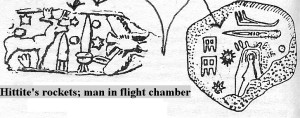 (evidence of alien presence on Earth)
(evidence of alien presence on Earth)
lest I make them fly around like a bird over its well-founded nest,
lest I requite (?) them as if at a current market rate, lest I make it gather dust like an utterly destroyed city,
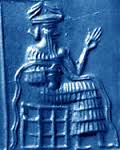
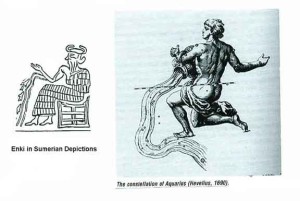 (Enki / Poseidon, god of waters)
(Enki / Poseidon, god of waters)
lest like a settlement cursed by Enki and utterly destroyed, I too utterly destroy Aratta;
lest like the devastation which swept destructively, and in whose wake Inanna arose,
shrieked and yelled aloud, I too wreak a sweeping devastation there —
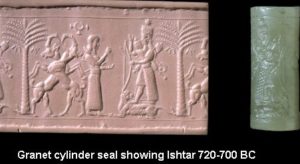 (Inanna, Goddess of War, her victory over Jericho)
(Inanna, Goddess of War, her victory over Jericho)
let Aratta pack nuggets of gold in leather sacks, placing alongside it the kumea ore;
package up precious metals, and load the packs on the donkeys of the mountains;
and then may the Junior Enlil (Enki) of Sumer have them build for me,
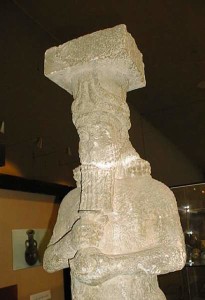 (Ea / Enki, eldest & wisest son to alien Anunnaki King Anu)
(Ea / Enki, eldest & wisest son to alien Anunnaki King Anu)
the lord whom Nudimmud (Enki) has chosen in his sacred heart, a mountain of a shining me;
(alien technologies) have them make it luxuriant for me like a boxwood tree,
have them make its shining horns colorful for me as when Utu comes forth from his chamber,
have them make its doorposts gleam brightly for me.” “
134-155 “Chant to him the holy song,
the incantation sung in its chambers — the incantation of Nudimmud (Enki):
“On that day when there is no snake, when there is no scorpion,
when there is no hyena, when there is no lion, when there is neither dog nor wolf,
when there is thus neither fear nor trembling, man has no rival!
At such a time, may the lands of Cubur and Hamazi, the many-tongued,
and Sumer, the great mountain of the me of magnificence (alien technologies),
and Akkad, the land possessing all that is befitting,
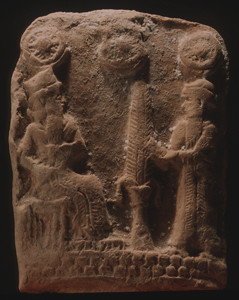 (Martu & giant mixed-breed king, above, many symbols of the gods)
(Martu & giant mixed-breed king, above, many symbols of the gods)
and the Martu (Martu’s) land, resting in security — the whole universe, the well-guarded people —
may they all address Enlil together in a single language!
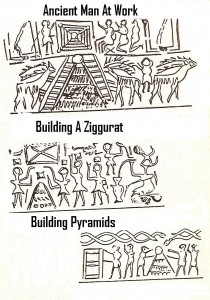 (earthlings mining & doing construction work for the Anunnaki gods ruling Earth)
(earthlings mining & doing construction work for the Anunnaki gods ruling Earth)
For at that time, for the ambitious lords, for the ambitious princes, for the ambitious kings,
Enki, for the ambitious lords, for the ambitious princes, for the ambitious kings,
for the ambitious lords, for the ambitious princes, for the ambitious kings —
Enki, the lord of abundance and of steadfast decisions, the wise and knowing lord of the Land,
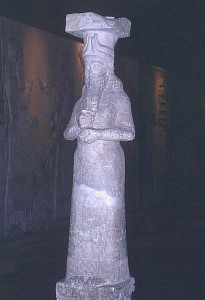 (Enki, eldest & wisest alien god sent to Earth Colony, 1st to arrive with crew of 50 Anunnaki)
(Enki, eldest & wisest alien god sent to Earth Colony, 1st to arrive with crew of 50 Anunnaki)
the expert of the gods, chosen for wisdom, the lord of Eridug (Eridu),
shall change the speech in their mouths, as many as he had placed there,
and so the speech of mankind is truly one. “
156-157 The lord added further instructions for the messenger going to the mountains, to Aratta:
158-159 “Messenger, by night, drive on like the south wind!
By day, be up like the dew!”
160-175 The messenger gave heed to the words of his king.
He journeyed by the starry night, and by day he traveled with Utu of heaven.
Where and to whom will he carry the important message of Inanna with its stinging tone?
He brought it up into the Zubi Mountains, he descended with it from the Zubi Mountains.
Su-sin (giant semi-divine mixed-breed King Shu-Suen) and the land of Ancan humbly saluted Inanna like tiny mice.
In the great mountain ranges, the teeming multitudes groveled in the dust for her.
He traversed five mountains, six mountains, seven mountains.
He lifted his eyes as he approached Aratta.
He stepped joyfully into the courtyard of Aratta, he made known the authority of his king.
Openly he spoke out the words in his heart.
The messenger transmitted the message to the lord of Aratta:
176-178 “Your father, my master, has sent me to you;
the lord of Unug (Uruk, Inanna’s patron city), the lord of Kulaba, has sent me to you.”
“What is it to me what your master has spoken?
What is it to me what he has said?”
179-207 “This is what my master has spoken, this is what he has said.
My king who from his birth has been fitted for lordship (1 ms. has instead: for the crown),
the lord of Unug, the sajkal snake living in Sumer,
who pulverizes mountains (2 mss. have instead: heads) like flour,
the stag of the tall mountains, endowed with princely antlers,
wild cow, kid pawing the the holy soapwort with its hoof,
whom the good cow had given birth to in the heart of the mountains,
Enmerkar, the son of Utu, has sent me to you.”
(2 mss. add here: (the lord of Aratta speaks):
“What is it to me what your master has spoken? what is it to me what he has said?”)
“This is what my master said:
“Lest I make the people fly off from that city like a wild dove from its tree,
lest I make them fly around like a bird over its well-founded nest,
lest I requite (?) them as if at a current market rate,
lest I make it gather dust like an utterly destroyed city,
lest like a settlement cursed by Enki and utterly destroyed, I too utterly destroy Aratta;
lest like the devastation which swept destructively, and in whose wake Inanna arose,
shrieked and yelled aloud, I too wreak a sweeping devastation there —
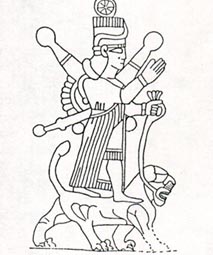
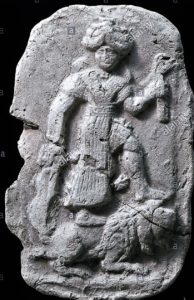 (Inanna atop her zodiac symbol of Leo, Goddess of Love & War)
(Inanna atop her zodiac symbol of Leo, Goddess of Love & War)
let Aratta pack nuggets of gold in leather sacks, placing alongside it the kumea ore;
package up precious metals, and load the packs on the donkeys of the mountains;
and then may the Junior Enlil of Sumer have them build for me,
the lord whom Nudimmud (Enki) has chosen in his sacred heart, a mountain of a shining me;
have them make it luxuriant for me like a boxwood tree,
have them make its shining horns colorful for me as when Utu comes forth from his chamber,
have them make its doorposts gleam brightly for me.
Chant to him for me the holy song, the incantation sung in its chambers — the Incantation of Nudimmud.”’
208-217 “Say whatever you will say to me,
and I shall announce that message in the shrine E-ana (Anu’s temple / residence in Uruk)
as glad tidings to the scion of him with the glistening beard,
whom his stalwart cow gave birth to in the mountain of the shining me,
who was reared on the soil of Aratta, who was given suck at the udder of the good cow,
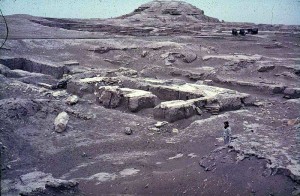 (Uruk city & ziggurat temple residence of gods & goddesses)
(Uruk city & ziggurat temple residence of gods & goddesses)
who is suited for office in Kulaba, the mountain of great me (alien technologies),
to Enmerkar, the (giant mixed-breed grandson, & brother-in-law) son of Utu;
I shall repeat it in his jipar, fruitful as a flourishing mes tree, to my king, the lord of Kulaba.”
218-226 When he had spoken thus to him, (the lord of Aratta replied):
“Messenger, speak to your king, the lord of Kulaba, and say to him:
“It is I, the lord suited to purification, I whom the huge heavenly neck-stock,
the queen of heaven and earth, the goddess of the numerous me (alien technologies),
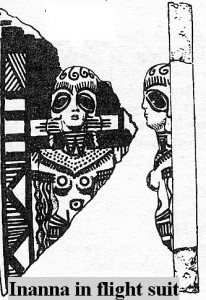
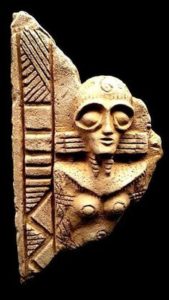 (Inanna wearing the 7 MEs, her alien flight suit)
(Inanna wearing the 7 MEs, her alien flight suit)
holy Inanna, has brought to Aratta, the mountain of the shining me,
I whom she has let bar the entrance of the mountains as if with a great door.
How then shall Aratta submit to Unug?
Aratta’s submission to Unug is out of the question!” Say this to him.”
227-235 When he had spoken thus to him, the messenger replied to the lord of Aratta:
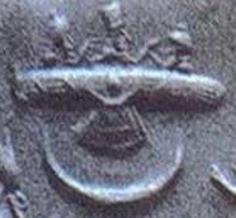
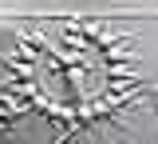 (Inanna high above riding her sky-disc / me)
(Inanna high above riding her sky-disc / me)
“The great queen of heaven, who rides upon the awesome me (sky-disc),
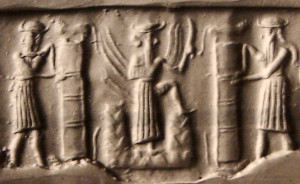
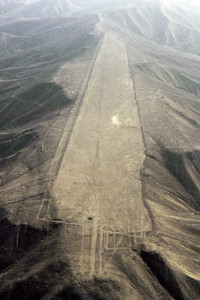
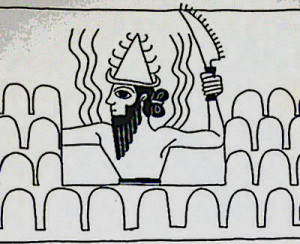
(ancient alien landing strip, Utu cut mountain peaks for alien launches & landings far away from the earthlings)
dwelling (landing & residing) on the peaks of the bright mountains,
adorning the dais of the bright mountains —
my lord and master, who is her servant, has had them install her as the divine queen of E-ana.
Aratta shall bow, O lord, in absolute submission!
She has spoken to him thus, in brick-built Kulaba.”
236-241 Thereupon, the lord became depressed and deeply troubled.
He had no answer; he was searching for an answer.
He stared at his own feet, trying to find an answer.
He found an answer and gave a cry.
He bellowed the answer to the message like a bull to the messenger:
242-273 “Messenger! Speak to your king, the lord of Kulaba, and say to him:
“This great mountain range is a mes tree grown high to the sky;
its roots form a net, and its branches are a snare.
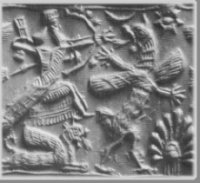 (Anzu as a bird)
(Anzu as a bird) 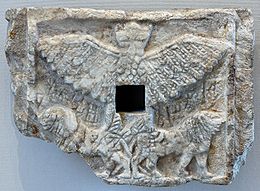
It may be a sparrow but it has the talons of an Anzud (Anzu) bird or of an eagle.
The barrier of Inanna is perfectly made and is impenetrable (?).
Those eagle talons make the blood of the enemy run from the bright mountain.
Although in Aratta there is weeping ……, water libations are offered and flour is sprinkled;
on the mountain, sacrifices and prayers are offered in obeisance.
With fewer than five or ten men, how can mobilized Unug proceed against the Zubi mountains?
Your king is heading in all haste against my military might, but I am equally eager for a contest.
(As the proverb goes,) he who ignores a rival, does not get to eat everything up,
like the bull which ignores the bull at its side.
But he who acknowledges a contest can be the outright winner,
like the bull which acknowledges the bull at its side — or does he reject me in this contest?
Like ……, …… can match no one — or does he still reject me in this contest?
Again, I have words to say to you, messenger:
I have an artful proposal to make to you ……, may it get across to you ……..
Repeat this to your master, to the lord of Kulaba,
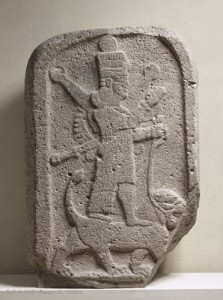
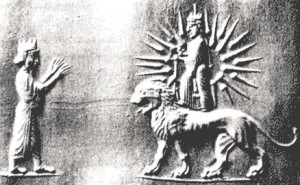 (Inanna atop her zodiac symbol of Leo)
(Inanna atop her zodiac symbol of Leo)
a lion lying on its paws in E-ana (Anu‘s Uruk temple-residence),
a bull bellowing within it, within his jipar, fruitful as a flourishing mes tree.
The mountain range is a warrior, …… high,
like Utu (Sun god) going to his abode at twilight, like one from whose face blood drips;
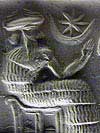
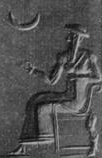 (Nannar. Moon Crescent god of Ur)
(Nannar. Moon Crescent god of Ur)
or like Nanna, who is majestic in the high heavens,
like him whose countenance shines with radiance, who …… is like the woods in the mountains. ” “
274-280 ‘”Now if Enmerkar just makes straight for the …… of Aratta,
for the benevolent protective spirit of the mountain of holy powers,
for Aratta, which is like a bright crown of heaven, then I shall make my pre-eminence clear,
and he need not pour barley into sacks, nor have it carted,
nor have that barley carried into the settlements, nor place collectors over the laborers.” “
281-293 “But if he were actually to have barley poured into carrying-nets,
and to have it loaded on the packasses at whose sides reserve donkeys have been placed,
and were to have it heaped up in a pile in the courtyard of Aratta —
were he really to heap it up in such a manner; and were Inanna, the luxuriance of the grain pile,
who is the ‘illuminator of the lands’, the ‘ornament of the settlements’,
who adorns the seven walls, who is the heroic lady, fit for battle,
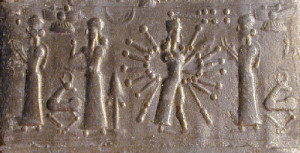
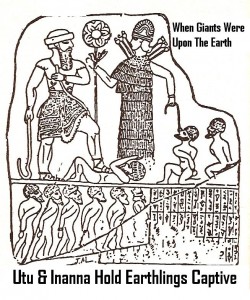
(Ninurta, flying sky-disc, Enlil, & Inanna with alien weaponry; Inanna holds earthlings captive, one by nose ring)
who, as the heroine of the battleground, makes the troops dance the dance of Inanna —
were she actually to cast off Aratta as if to a carrion-pursuing dog,
then in that case I should submit to him; he would indeed have made me know his preeminence;
like the city, I in my smallness would submit to him. “So say to him.”
294-307 After he had spoken thus to him, the lord of Aratta
made the messenger repeat the message just as he himself had said it.
The messenger turned on his thigh like a wild cow; like a sand fly he went on his way in the morning calm.
He set foot joyfully in brick-built Kulaba.
The messenger rushed to the great courtyard, the courtyard of the throne room.
He repeated it word perfect to his master, the lord of Kulaba;
he even bellowed at him like a bull, and Enmerkar listened to him like an ox driver.
The king had him sit …… at his right side.
As he turned his left side to him, he said:
“Does Aratta really understand the implications of his own stratagem?”
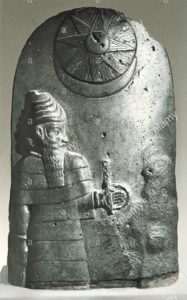
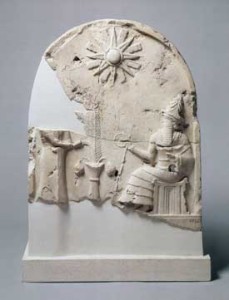 (damaged king before Utu, the Sun god)
(damaged king before Utu, the Sun god)
308-338 After day had broken and Utu had risen, the sun god of the Land lifted his head high.
The king combined the Tigris with the Euphrates.
He combined the Euphrates with the Tigris.
Large vessels were placed in the open air,
and he stood small vessels beside them, like lambs lying on the grass.
…… vessels were placed in the open air adjacent to them.
Then the king, Enmerkar, the son of Utu, placed wide apart the ecda vessels, which were of gold.
Thereupon, the tablet ……, the pointed stylus of the assembly, the golden statue
fashioned on a propitious day, beautiful Nanibgal (Nisaba), grown with a fair luxuriance,
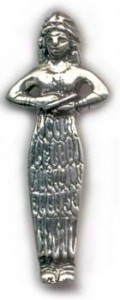
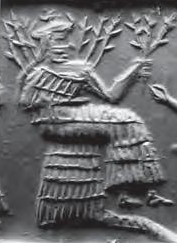 (Nisaba, Enlil‘s mother-in-law, Master Scribe of the Gods, & Goddess of Grains)
(Nisaba, Enlil‘s mother-in-law, Master Scribe of the Gods, & Goddess of Grains)
Nisaba, the lady of broad wisdom, opened for him her holy house of wisdom.
He entered the palace of heaven, and became attentive.
Then the lord opened his mighty storehouse, and firmly set his great lidga measure on the ground.
The king removed his old barley from the other barley;
he soaked the greenmalt all through with water; its lip …… the hirin plant.
He narrowed the meshes of the carrying nets.
He measured out in full (?) the barley for the granary, adding for the teeth of locusts.
He had it loaded on the packasses at whose sides reserve donkeys were placed.
The king, the lord of broad wisdom, the lord of Unug, the lord of Kulaba, dispatched them directly to Aratta.
He made the people go on to Aratta on their own, like ants out of crevices.
Again the lord added instructions for the messenger going to the mountains, to Aratta:
339-346 “Messenger, speak to the lord of Aratta and say to him:
 (young Inanna, spoiled granddaughter to Earth Colony Commander Enlil)
(young Inanna, spoiled granddaughter to Earth Colony Commander Enlil)
“The base of my scepter is the divine power of magnificence (alien technologies).
Its crown provides a protective shade over Kulaba;
under its spreading branches holy Inanna refreshes herself in the shrine E-ana (Uruk’s ziggurat temple residence).
Let him snap off a splinter from it and hold that in his hand;
let him hold it in his hand like a string of cornelian beads, a string of lapis lazuli beads.
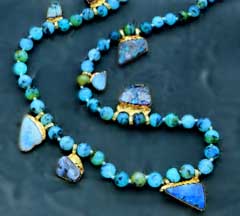 (lapis-lazuli necklace, favorite gemstone of Inanna & other goddesses)
(lapis-lazuli necklace, favorite gemstone of Inanna & other goddesses)
Let the lord of Aratta bring that before me.” So say to him.”
347-365 After he had thus spoken to him, the messenger went on his way to Aratta;
his feet raised the dust of the road, and made the little pebbles of the hills thud;
like a dragon prowling the desert, he was unopposed.
After the messenger reached Aratta, the people of Aratta stepped forward to admire the packasses.
In the courtyard of Aratta, the messenger measured out in full (?)
the barley for the granary, adding for the teeth of locusts.
As if from the rains of heaven and the sunshine, Aratta was filled with abundance.
As when the gods return to their seats (?), Aratta’s hunger was sated.
The people of Aratta covered their fields with the water-soaked greenmalt.
Afterwards, couriers and catam officials …….
2 lines unclear
366-370 The citizens of Aratta were mindful; he revealed the matter to Aratta.
Attentively, in Aratta, from the hand ……. …… his hand …… to the lord of Unug.
371-372 “As for us, in the direst hunger, in our direst famine,
let us prostrate ourselves before the lord of Kulaba!”
373-377 The eloquent elders wrung their hands in despair, leaning against the wall;
indeed, they were even placing their treasuries (?) at the disposal of the lord.
His scepter …… in the palace …….
Openly he spoke out the words in his heart:
378-379 “Your father, my master, sent me to you.
Enmerkar, the (grandson) son of Utu, sent me to you.”
380-388 “What is it to me what your master has spoken?
What is it to me what he has said?”
“This is what my master has spoken, this is what he has said:
“The base of my scepter is the divine power of magnificence.
Its crown provides a protective shade over Kulaba;
under its spreading branches holy Inana refreshes herself in the shrine E-ana (Uruk’s ziggurat).
Let him snap off a splinter from it and hold that in his hand;
let him hold it in his hand like a string of cornelian beads, a string of lapis lazuli beads.
Let the lord of Aratta bring that before me. So say to him.” ”
389-393 After he had spoken thus to him,
for that reason he went inside the sanctuary …… and lay himself down in a fast.
Day broke. He discussed the matter at length, he spoke unspeakable words;
he circulated with this matter as if it were barley eaten by a donkey.
394-396 And what did one speak to another?
What did one say to another?
What one said to another, so indeed it was.
397-411 “Messenger, speak to your king, the lord of Kulaba, and say to him:
“Let him put in his hand and contemplate a scepter that is not of wood,
nor designated as wood ildag wood, nor cim-gig wood, not cedar wood, nor cypress wood,
not hacur cypress, nor palm wood, not hardwood, nor zabalum woodildag wood,
nor cim-gig wood, not hacur cypress, nor palm wood, not cedar wood,
nor zabalum wood, not cypress wood, nor hardwood, not poplar as in a chariot,
not reedwork as in whip handles; not gold, nor copper,
not genuine kumea metal nor silver, not cornelian, nor lapis lazuli —
let him snap off a splinter from that and hold it in his hand;
let him hold it in his hand like a string of cornelian beads, a string of lapis lazuli beads.
Let the lord of Kulaba bring that before me.”
So say to him.”
412-443 After he had spoken to him thus, the messenger went off like a young donkey,
braying as it is cut off from the chariot tongue; he trotted like an onager running on dry land,
he filled his mouth with wind; he ran in one track (?)
like a long-wooled sheep butting other sheep in its fury.
He set foot joyfully in brick-built Kulaba.
He transmitted the message word for word to his master, the lord of Kulaba.
Now Enki gave Enmerkar wisdom, and the lord gave instructions to his chief steward.
In his house ……, the king received …….
He wrapped it up like ……, and inspected it.
He pounded …… with a pestle like herbs, he poured it like oil on the …… reed.
From the sunlight it emerged into the shade, and from the shade it emerged into the sunlight.
After five years, ten years had passed, he split the …… reed with an ax.
The lord looked at it, pleased, and poured on …… fine oil, fine oil of the bright mountains.
The lord placed the scepter in the hands of the messenger going to the mountains.
The messenger, whose journeying to Aratta was like a pelican over the hills, like a fly over the ground,
who darted through the mountains as swiftly as carp swim, reached Aratta.
He set foot joyfully in the courtyard of Aratta, and put the scepter in …….
He …… and …… it.
The lord of Aratta, eying the scepter, which was …… in the sanctuary,
his holy dwelling — he, the lord, called to his catam official:
444-453 “Aratta is indeed like a slaughtered sheep!
Its roads are indeed like those of the rebel lands!
Since holy Inanna has given the primacy of Aratta to the lord of Kulaba,
now it seems that holy Inanna is looking with favor on her man
who has sent a messenger to make the severe message as clear as the light of Utu.
So in Aratta where can one go in this crisis?
How long before the yoke-rope becomes bearable?
As for us, in the direst hunger, in our direst famine,
are we to prostrate ourselves before the lord of Kulaba?”
454-455 The lord of Aratta entrusted a message to the messenger as if it were an important tablet:
456-461 “Messenger! Speak to your master, the lord of Kulaba, and say to him:
“A champion who is not black-colored, a champion who is not white-colored,
a champion who is not brown-colored, a champion who is not red-colored,
a champion who is not yellow-colored, a champion who is not multi-colored —
let him give you such a champion.
My champion will compete against his champion, and let the more able one prevail!” Say this to him.”
462-469 After he had spoken to him thus, the messenger set off, ulum, alam.
In brick-built Kulaba, he was speechless, like a …….
He gazed like a goat on the mountain slopes, he …… as if it were a huge mir snake coming out of a field.
In …… he lifted his head.
…… of Aratta …….
From his seat, he addressed him like a raging torrent:
470-499 “Messenger! Speak to the lord of Aratta and say to him:
“A garment that is not black-colored, a garment that is not white-colored,
a garment that is not brown-colored, a garment that is not red-colored,
a garment that is not yellow-colored, a garment that is not multi-colored — I shall give him such a garment.
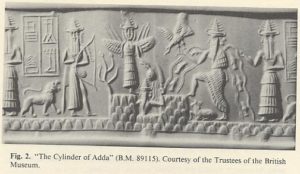 (Enlil, Inanna, Utu, Enki, & 2-faced Isumud)
(Enlil, Inanna, Utu, Enki, & 2-faced Isumud)
My champion is embraced by Enlil.
I shall send him such a champion.
My champion will compete against his champion, and let the more able one prevail!”
Say this to him. Second, speak to him and say:
“Let him immediately pass from subterfuge …….
In his city, let them go before him like sheep.
Let him, like their shepherd, follow behind them.
As he goes, let the mountain of bright lapis lazuli humble itself before him like a crushed reed.
And let them heap up its shining gold and silver in the courtyard of Aratta for Inanna the lady of E-ana.”
Third, speak to him and say:
“Lest I make the people fly off from that city like a wild dove from its tree,
lest I smash them like ……, lest I requite (?) them as if at a current market rate,
lest I make …… them walk in ……, when he goes, let them take the mountain stones,
and rebuild for me the great shrine Eridug, the Abzu, the E-nun; let them adorn its architrave for me …….
Let them make its protection spread over the Land for me.”
His speaking …….
Recite his omen to him.
At that time, the lord ……, …… on the throne daises and on the chairs, the noble seed, …….”
500-514 His speech was substantial, and its contents extensive.
The messenger, whose mouth was heavy, was not able to repeat it.
Because the messenger, whose mouth was tired, was not able to repeat it,
the lord of Kulaba patted some clay and wrote the message as if on a tablet.
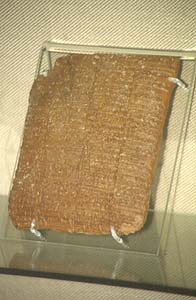
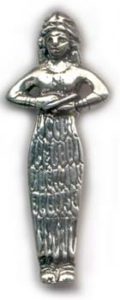
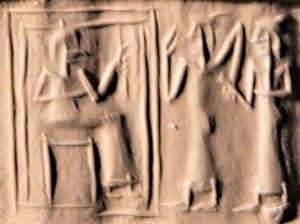
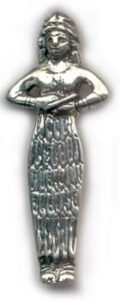
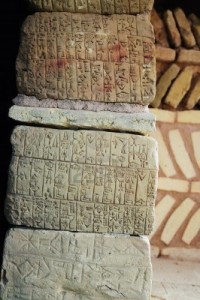

(Mesopotamian cuneiform tablets; Nisaba, Master Scribe with stylus & tablet in hand; Earth’s 1st writing – historical records)
Formerly, the writing of messages on clay was not established.
Now, under that sun and on that day, it was indeed so.
The lord of Kulaba inscribed the message like a tablet.
It was just like that.
The messenger was like a bird, flapping its wings; he raged forth like a wolf following a kid.
He traversed five mountains, six mountains, seven mountains.
He lifted his eyes as he approached Aratta.
He stepped joyfully into the courtyard of Aratta, he made known the authority of his king.
Openly he spoke out the words in his heart.
The messenger transmitted the message to the lord of Aratta:
515-517 “Your father, my master, has sent me to you;
the lord of Unug, the lord of Kulaba, has sent me to you.”
“What is it to me what your master has spoken?
What is it to me what he has said?”
518-535 “This is what my master has spoken, this is what he has said.
My king is like a huge mes tree, …… son of Enlil; this tree has grown high, uniting heaven and earth;
its crown reaches heaven, its trunk is set upon the earth.
He who is made to shine forth in lordship and kingship,
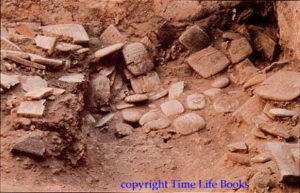 (tens of thousands of ancient clay tablets)
(tens of thousands of ancient clay tablets)
Enmerkar, the son of Utu, has given me a clay tablet.
O lord of Aratta, after you have examined the clay tablet,
after you have learned the content of the message,
say whatever you will say to me, and I shall announce that message in the shrine E-ana
as glad tidings to the scion of him with the glistening beard,
whom his stalwart cow gave birth to in the mountains of the shining me,
who was reared on the soil of Aratta, who was given suck at the udder of the good cow,
who is suited for office in Kulaba, the mountain of great me (alien technologies),
to Enmerkar, the (giant mixed-breed grandson) son of Utu (appointed as king of Uruk);
I shall repeat it in his jipar, fruitful as a flourishing mes tree, to my king, the lord of Kulaba.”
536-556 After he had spoken thus to him,
the lord of Aratta received his kiln-fired tablet from the messenger.
The lord of Aratta looked at the tablet.
The transmitted message was just nails, and his brow expressed anger.
The lord of Aratta looked at his kiln-fired tablet.
At that moment, the lord worthy of the crown of lordship,
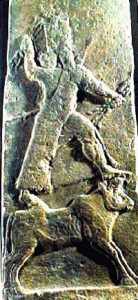
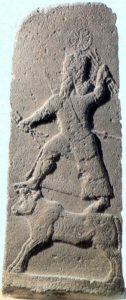 (Ishkur / Adad, Thunder God atop his zodiac symbol of Taurus)
(Ishkur / Adad, Thunder God atop his zodiac symbol of Taurus)
the (3rd main) son of Enlil, the god Ickur (Ishkur / Adad, born on Earth),
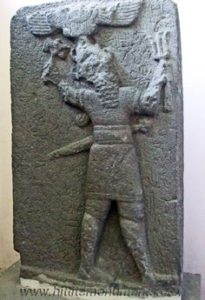
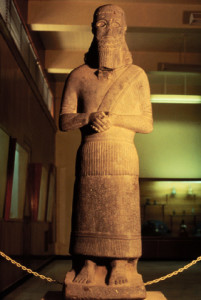 (Adad stele & statue, now shamefully destroyed by Radical Islam)
(Adad stele & statue, now shamefully destroyed by Radical Islam)
thundering in heaven and earth, caused a raging storm, a great lion, in …….
He was making the mountains quake ……, he was convulsing the mountain range ……;
the awesome radiance …… of his breast; he caused the mountain range to raise its voice in joy.
On Aratta’s parched flanks, in the midst of the mountains,
wheat grew of its own accord, and chickpeas also grew of their own accord;
they brought the wheat which grew of its own accord into the granary of ……
for the lord of Aratta, and heaped it up before him in the courtyard of Aratta.
The lord of Aratta looked at the wheat.
The messenger’s eyes looked askance …….
The lord of Aratta called to the messenger:
557-576 “Inanna, the lady of all the lands, has not run away from the primacy of her city, Aratta,
nor has she stolen it for Unug (Uruk);
she has not run away from her E-zagina, nor has she stolen it for the shrine E-ana;
she has not run away from the mountain of the shining me, nor has she stolen it for brick-built Kulaba;

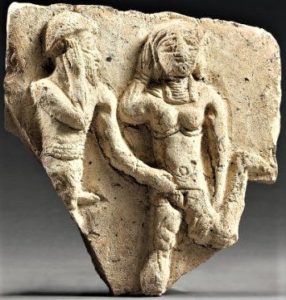 (Inanna, Goddess of Love & War)
(Inanna, Goddess of Love & War)
she has not run away from the adorned bed, nor has she stolen it for the shining bed;
she has not run away from the purification for the lord, nor has she stolen it for the lord of Unug,
the lord of Kulaba. Inanna, the lady of all the lands, has surrounded Aratta,
on its right and left, for her like a rising flood.
They are people whom she has separated from other people,
they are people whom Dumuzid has made step forth from other people,
who firmly establish the holy words of Inanna.
Let the clever champion and the …… of Dumuzid (Inanna‘s spouse) whirl about!
Quickly, come now, …….
After the flood had swept over, Inanna, the lady of all the lands,
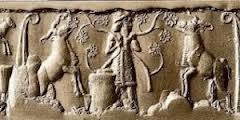 (Dumuzi, Inanna‘s 1st spouse, after his death, Inanna espoused mixed-breeds)
(Dumuzi, Inanna‘s 1st spouse, after his death, Inanna espoused mixed-breeds)
from her great love of Dumuzid (Dumizi), has sprinkled the water of life
upon those who had stood in the face of the flood and made the Land subject to them.”
577-587 The clever champion, when he came, had covered his head with a colorful turban,
and wrapped himself in a garment of lion skins.
4 lines unclear
Inanna …….
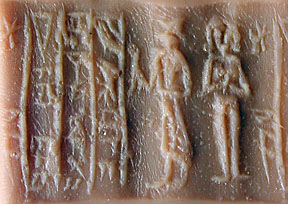
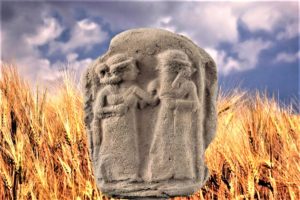 (Dumuzi & his naked young spouse Inanna)
(Dumuzi & his naked young spouse Inanna)
Her song was pleasing to her spouse, Ama-ucumgal-ana (Dumuzi).
Since that time, she has made it perfect in the holy ear,
the holy ear of Dumuzid, has sung it and has let the words be known.
588-610 When the old woman came to the mountain of the shining me,
she went up to him like a maiden who in her day is perfect, painted her eyes with kohl,
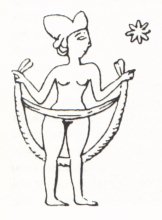 (Inanna, Goddess of Love & her 8-pointed star symbol of Venus, 8th planet in from outer space)
(Inanna, Goddess of Love & her 8-pointed star symbol of Venus, 8th planet in from outer space)
wrapped herself in a white garment, came forth with the good crown like the moonlight.
She arranged the …… on her head.
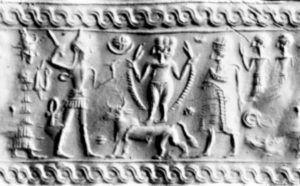 (Ninsun, Utu, naked Inanna, & a mixed-breed king)
(Ninsun, Utu, naked Inanna, & a mixed-breed king)
She made Enmerkar, her spouse, occupy the throne-dais with her.
She raised up ……, and indeed, for Aratta, the ewes and their lambs now multiply;
indeed, for Aratta, the mother goats and their kids multiply;
indeed, for Aratta, the cows and their calves multiply;
indeed, for Aratta, the donkey mares and their black, swift-footed foals multiply.
In Aratta, they say together: “Let them heap up and pile up for the grain piles;
the abundance is truly your abundance.”
After having made …… for the lord of Aratta, let him …….
He will …….
He came forth ……, he set right for her.
3 lines missing
611-625 (An unidentified person speaks:) “…… befitting ……,
…… the ilu song of the heart, …… your abundance in his …….
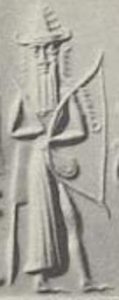
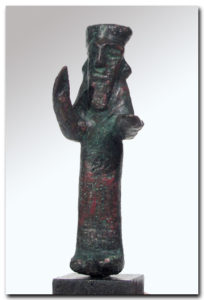 (Enlil, Earth Colony Commander)
(Enlil, Earth Colony Commander)
Enlil has granted you ……, and may …… be made known.
…… his father was not luxuriantly fertile, and poured forth no semen.
Enlil, king of all the lands …….
In accordance with the tasks which he has now established, the people of Aratta ……
their task of plying gold, silver and lapis lazuli; the men who …… golden fruit,
fruit trees, with their figs and grapes, shall heap the fruit up in great mounds ……;
and shall dig out the flawless lapis lazuli from the roots of the trees,
and shall remove the succulent part of the reeds from the crowns of the trees,
and then shall heap them up in a pile in the courtyard of E-ana for Inanna, the lady of E-ana.“
626-636 “Come, my king, I shall offer you advice: let my counsel be heeded.
I shall speak words to you; let them be heard.
Let the people choose a man …… of the foreign lands, and let the people of Aratta speak …….
When I go from here, the ever-sparkling lady gives me my kingship.
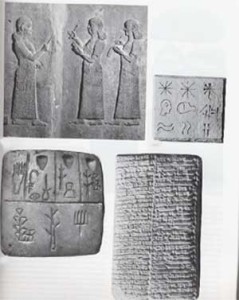 (Geshtinanna / Jectinana Dumuzi‘s younger sister, scribe & singer of songs)
(Geshtinanna / Jectinana Dumuzi‘s younger sister, scribe & singer of songs)
Jectin-ana …….In that city ……, festivals were not …….
Daily …….
6 lines missing
